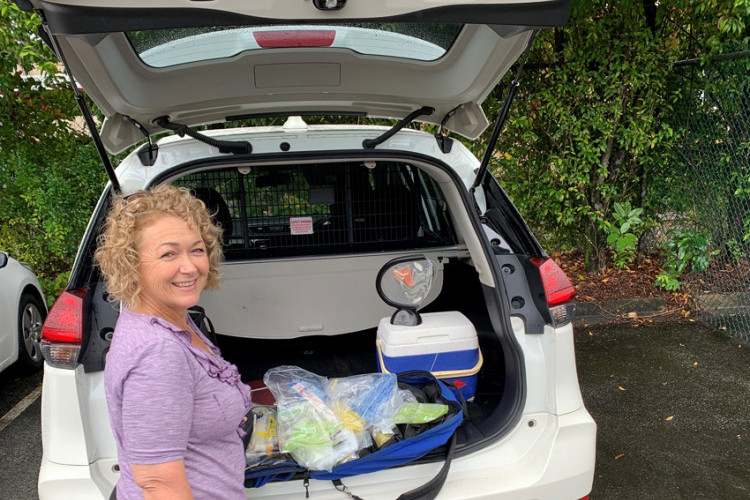Community
27 May, 2021
Face to face remote health service
Queensland Health’s Mobile Women’s Health Services is celebrating 30 years of delivering cervical screening and health checks to women living in the state’s rural and remote communities.

Since its inception in 1991, the Mobile Women’s Health Service has expanded and currently visits a total of 151 communities from 10 base locations across the state, consulting with more than 5,200 women each year.
The service was established as an outreach to women in rural and remote communities that connects them to qualified, independent practitioners who facilitate screening opportunities that enable the individual to be proactive about their health and wellbeing. Access provides increased early detection of screening preventable abnormalities and therefore improves consumer outcomes and reduces burden to healthcare. Cancer Screening funded service administrated by the local Hospital Health Services.
Cher Heritage from the Cairns Hospital and Health Service region is one of 12 specially trained registered nurses providing the free and confidential service for women across the state.
She has been working in the area of sexual and reproductive health since 1996, GP Cervical Smear Nurse for 9 years and more specifically with the Mobile Women’s Service for the past 18 months, providing rural and remote women’s health services across a 142,900 square kilometre region.
Mrs Heritage has cared for hundreds of women across all stages of life, with numerous clients consulting with her and returning to the service in an ongoing basis or as required.
“I do this work to provide rural and regional women with high quality, preventative assessment and screening, then linking to appropriate health services by referral that supports improved health outcomes. This therapeutic relationship with women as a service provider is extremely rewarding and satisfying,” she said.
“All women, no matter who they are or where they live, should be afforded the same access to health services as those living in urban areas. When a woman drives for 4 hours to see you in a tiny, remote clinic area for an hour’s consultation, you know your service delivery is valued. It is a supreme privilege in that very moment for me.”
“I love this work, it’s a vocation that I hope I will be involved in until my own retirement as my previous predecessor Mavis Christensen is now enjoying.”
Queensland Health’s Preventive Health Branch Executive Director, Mark West, said the Mobile Women’s Health Service nurses addressed a range of topics related specifically to women’s health and wellbeing, including cervical screening, STIs, contraception and family planning, gynaecological issues, psychosocial issues, nutrition, smoking and preventive health, with clients ranging across all age groups.
“It’s important to offer women in these communities the opportunity to talk to a female practitioner about their health and wellbeing,” Mr West said.
“Some smaller communities have no GP or limited access to a female GP. At times, women may prefer a female practitioner for a variety of personal or cultural reasons.
“This service is especially important for Aboriginal and Torres Strait Islander women who often live in the state’s most remote locations, but also are more likely to develop chronic disease compared to non-Indigenous Queenslanders,” he said.
Mr West said prevention is better than cure, and the Mobile Women’s Health Service is one way to help encourage women to be proactive about their health needs.
“Especially because of the remoteness of some areas, there is a focus on providing information to women to help them avoid ill health through good nutrition, exercise, quitting smoking and keeping their cervical screening up to date,” he said.
“They also actively refer clients on a needs basis to a variety of agencies from GPs, Allied Health Services, BreastScreen QLD, gynaecological outpatient services, and community agencies as needed.
“Since the Mobile Women’s Health Service and the Queensland Cervical Screening Program was initiated in 1991, the increased choice of provider has seen more Queensland women having cervical screening tests, and this has reduced the number of women developing cervical cancer.”
Between 2016 and 2020, the service collected more than 21,000 Pap Smear/Cervical Screening Tests state-wide, and nearly 100,000 tests since 2003.
“However, there is still a gap between indigenous women and non-indigenous women, and there is evidence that Indigenous women are generally under-screened.
“The Australian Institute of Welfare’s Cervical Screening in Australia in 2019Report states that the incidence of cervical cancer in Aboriginal and Torres Strait Islander women is more than two times that of non-indigenous women.
“One of our aims is to help close this gap by offering services to rural and remote communities.”
Mr West said there were some challenges associated with providing a health service to rural and remote regions of Queensland.
“It’s a challenge to service a state as large and decentralised as Queensland, and there’s also the added challenge of planning around wet seasons in the north of the state as many roads can get cut off due to flooding,” he said.
“Our nurses drive thousands of kilometres each year servicing their region, tackling remote dirt roads or flying into the state’s most remote locations, and some of them leave their families for a week or two at a time due to the long distances involved.
“The nurses set up in the most appropriate venue in the town – which could range from a room in a country hospital, a community centre or an aged care facility.”
For more information on the Mobile Women’s Health Service and upcoming locations, visit our website.


